Leiti 713 tulemust
Skip results of view Uudised
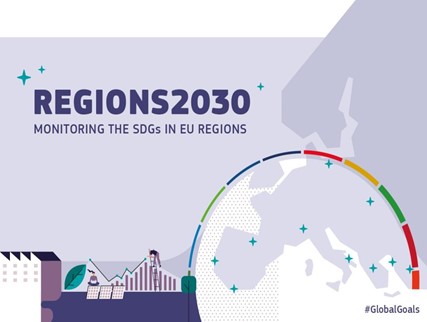
On 29 November 2022, the European Commission’s Joint Research Centre, in collaboration with the Directorate General for Regional and Urban Policy for Eurostat and with the support of the European Parliament and the European Committee of Regions launched the pilot project ‘ Monitoring the SDGs in the EU regions – Filling the data gaps – REGIONS2030 ’. It was proposed by MEP Petros Kokkalis in 2021 and approved by the European Commission in 2022. This project is a follow-up to the latest report on the implementation of the 2030 Agenda for Sustainable Development, in which the report incentivises

High dynamism and rapid innovation underpin the digital transformation of public administrations. As benefits of knowledge sharing are numerous, overcoming organisational silos by sharing best practices and lessons learned is crucial. Interoperable Europe , supported by Digital Europe Programme , is launching the second online edition of the ENDORSE (European Data Conference on Reference Data and Semantics) conference on 14 to 16 March 2023. Knowledge sharing in organisations is directly related to the production, dissemination and reuse of data and the creation, curation and sharing of
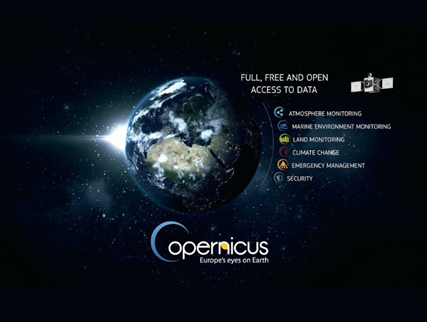
The European Union’s Earth Observation (EO) Programme ( Copernicus ) was launched to monitor our planet and its environment from space. Here, environment related climate risks not only have a major impact on people’s lives, but also on industries. One of the most affected industries is finance. If climate-related risks are not properly understood, they can lead to incorrect asset valuation, which can lead to capital misallocation and, in the worst-case scenario, global financial instability. In 2021, the EO data generated revenue of €145 million from clients in the finance and insurance
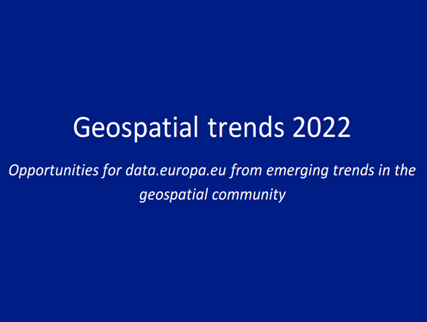
The annual Geospatial Trends 2022 report is now published on data.europa.eu. The aim of this report is to identify opportunities from emerging trends in the geospatial community and explore how data.europa.eu can benefit from the new ways in which geospatial datasets are offered and support the latest user expectations. The report concentrates on two trends of geospatial data that affect the European geospatial community: Modernising Infrastructure for Spatial Information in Europe (INSPIRE) and moving towards open data; and The role of geospatial information for Smart Cities. The report
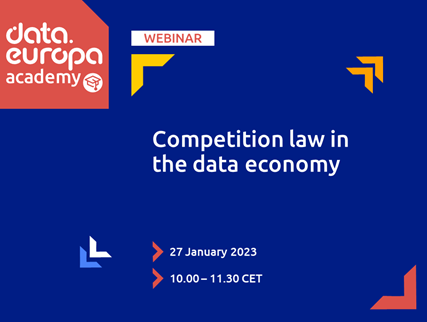
The proposed innovations of the Data Act will greatly impact data holders, data re-users and the legal landscape in Europe . The webinar titled ‘Competition law in the data economy : H ow will the evolving legal landscape affect data markets? ’ , scheduled for Friday 27 January 2023 at 10:00 to 11:30 CET, will give a detailed picture of this impact and also present the ongoing discussions and evolutions around competitive and anticompetitive data sharing practices . The webinar will focus on the current application of traditional competition law and the anticipated impact of the proposed Data
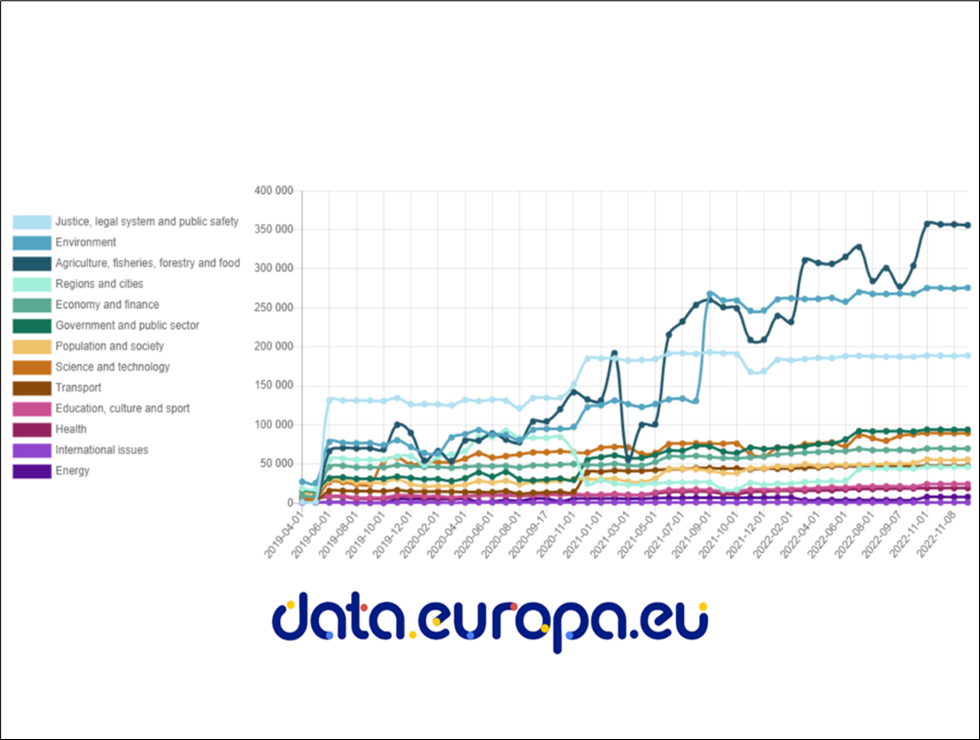
This news piece is the final article in the data.europa.eu recap and outlook series and will focus on the available open datasets on the portal and metadata quality. Data.europa.eu aims to be the single point of access for all open (meta)data across Europe. To this end, there was a steady increase of open datasets available on data.europa.eu throughout 2022. Between 1 January 2022 to 1 January 2023 , the total number of open datasets increased from 1 306 809 to 1 5 03 404 , with most of these datasets coming from the thematic areas : “Agriculture, fisheries, forestry and food” with 3 79 333
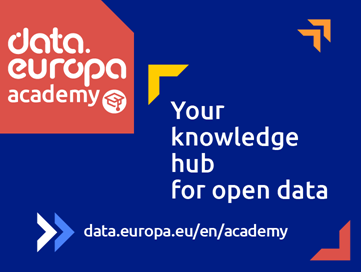
This is the second news piece in a series of three that will recap on the year 2022 and provide an outlook of what is to come in 2023. This release specifically focusses on the successes of the data.europa academy this year. In 2022, data.europa academy hosted 16 webinars on a broad range of topics. This included webinars in line with the main themes surrounding open data. The webinars on data and metadata quality , u nderstanding open data: legal openness , and measuring open data impact in Europe aligned with the technical, legal and impact themes respectively. The public webinars are
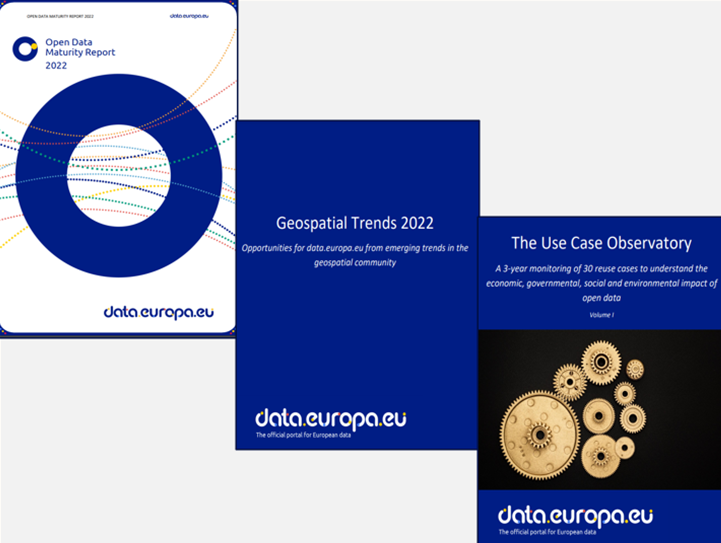
The data.europa.eu team wishes you all a happy new year! This news piece is the first of a series of three releases to recap and reflect on 2022 and to provide an outlook for 2023. This initial piece highlights a few publications and studies published in 2022 and gives a sneak-peak on what to expect in 2023. The publications and studies in 2022 covered several topics relating to open data. This includes technical topics (real-time and geospatial), legal topics (anti competitive law and the changing the legal environment ) and measuring the impact of open data. Examples of publications related

The data.europa.eu teach wishes you all happy holidays. As we prepare for 2023, we would like to thank all our data providers and data enthusiasts’ community for the support and engagement in our 2022 activities. We hope you will enjoy your holiday time with your beloved and if you want to treat yourself with some open data, don´t forget to check out our: Datasets , Statistics , Graph Search , and Metadata Quality Dashboard ; Data.europa.eu documentation on the portal, data quality, data citation and data visualisation; Publications , including the newly released Open Data Maturity 2022 ; Data
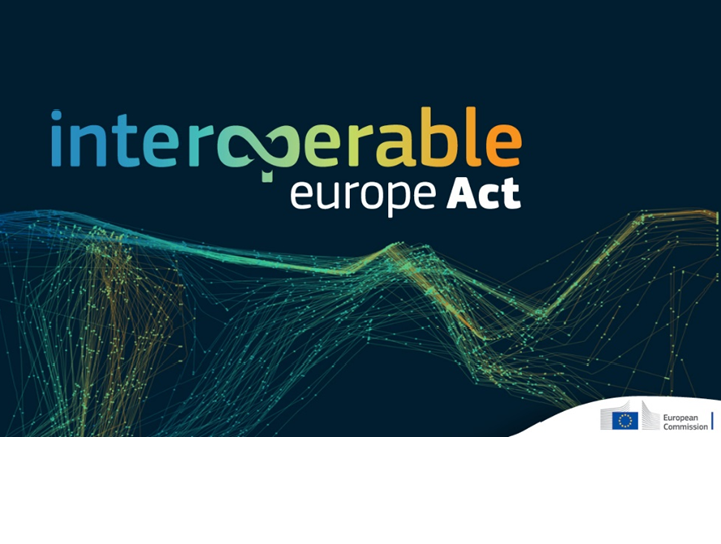
On 21 November 2022, the European Commission adopted the Interoperable Europe Act proposal to strengthen cross-border cooperation in public sectors across the EU. Public sector interoperability is the ability of administrations to cooperate and make public services function across borders, sectors and organisational boundaries. This Act introduces a cooperation framework across the EU that helps build a secure cross-border exchange of data and agree on shared digital solutions. For instance, the creation of the EU Digital COVID Certificate facilitated cross-border travel in the EU during the
